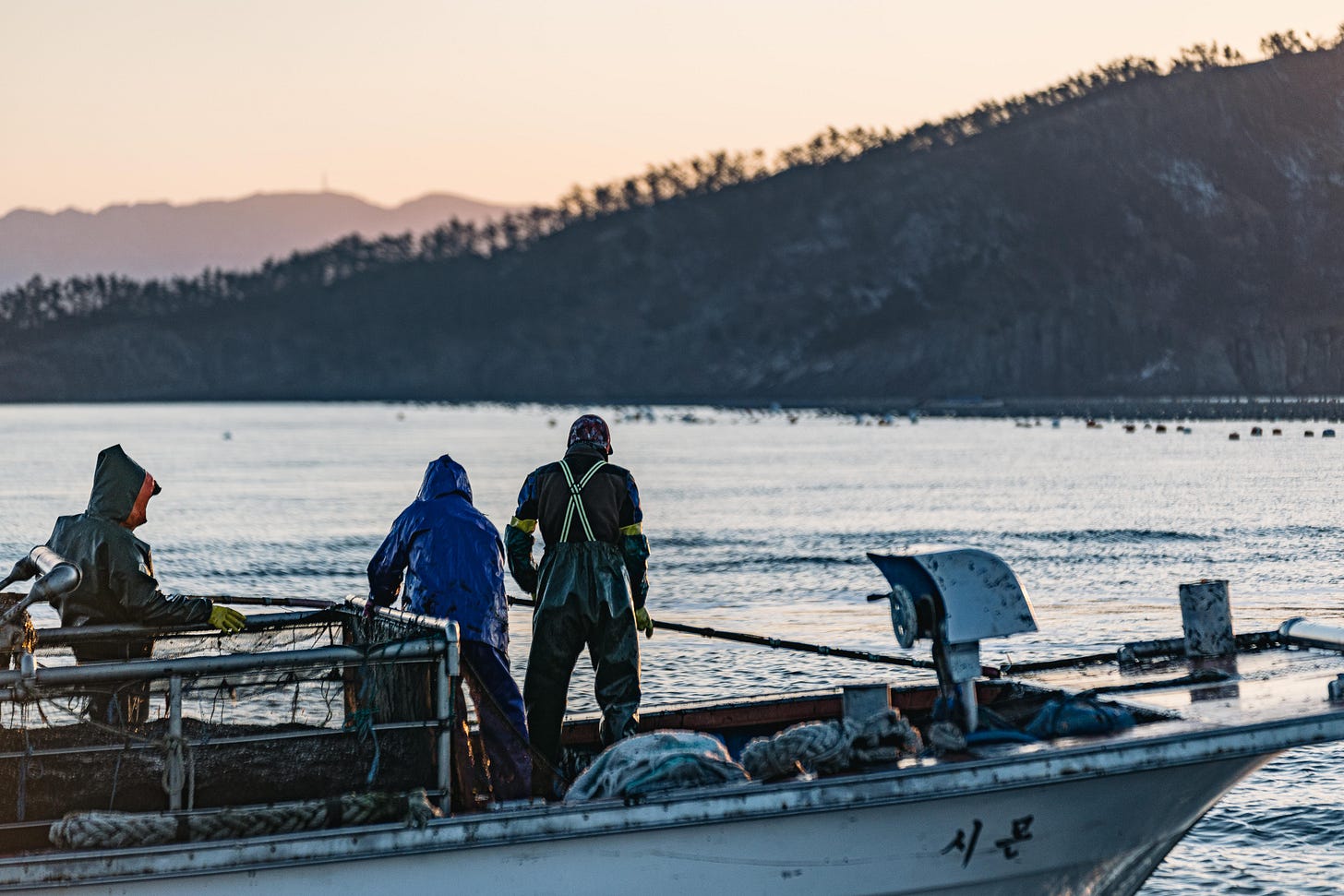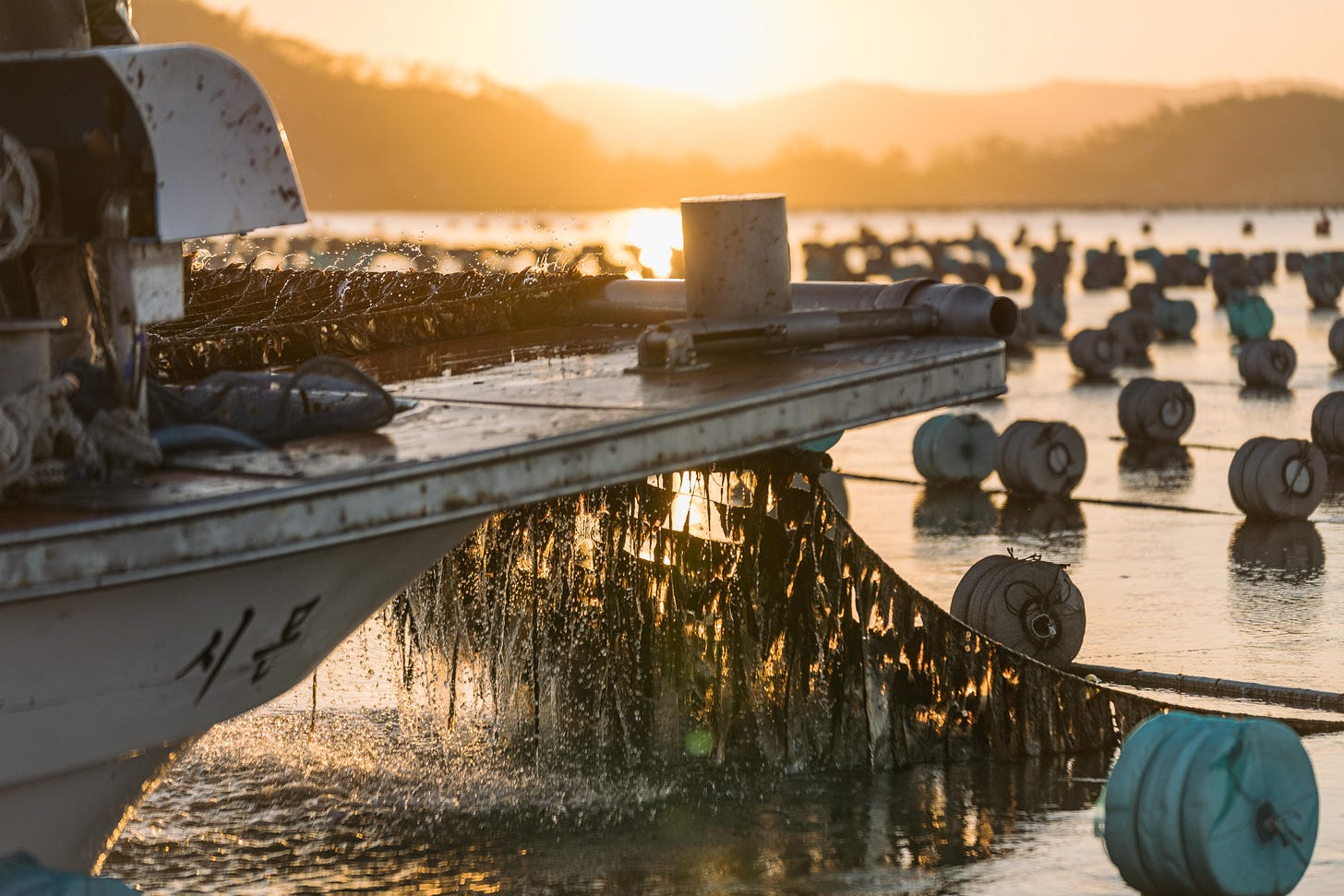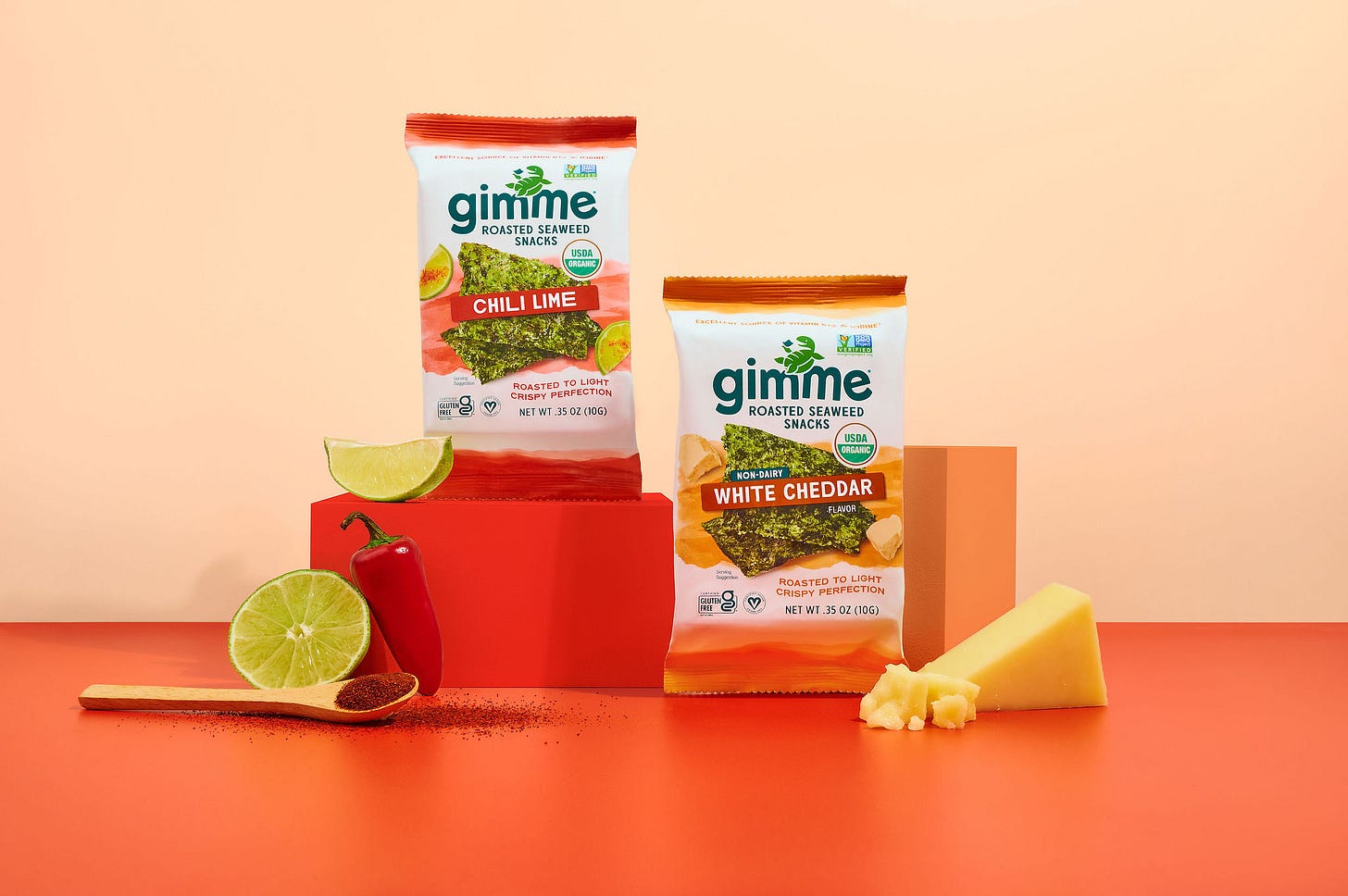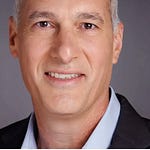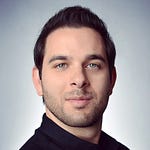A warm welcome to the 60 new subscribers who have joined since the last edition!
If you haven’t subscribed yet, sign up below to join a network of 2,730 climate tech entrepreneurs and investors. The Green Techpreneur (GT) will provide you with the actionable insight and connections you need to make your mark on the planet with your business!
In this Green Techpreneur episode, I spoke to the Co-founders of Gimme Seaweed to share how their journey of infusing passion, love, and a personal touch - connecting with customers as you would with friends and family - became keys to growing a household name brand that’s both delicious, nutritious and good for the planet.
“I’ll never forget that feeling I had, in the early morning, it was 6 a.m., I was 35 and at the farmers market and feeling like I was in charge of my life and about to go on this very refreshing journey. And that became Annie Chun’s and the start of all that transpired. It was based on really wanting to be myself and sharing the love and experience that I have. Based on this, I always make sure to connect with myself, who I am, and what I have learned.”
Annie Chun is the pioneer of an organic seaweed US snack brand, Gimme Seaweed, that has shifted what was a niche product into the mainstream market. She immigrated from Korea as a young woman in 1976 - but it was in selling homemade produce at a farmers market in 1991 that she found her North Star as a green techpreneur. At the time, she would never have imagined that her humble outdoor market beginnings would lead to building a household brand name.
So how did she beat the odds to build an exceptional business from the ground up?
“You're not really calculating, I'm going to put that into the US market, I did it truly as a friend, as a neighbour, one by one. And by doing so, I learnt a lot about what American culture is, how they connect, what they like. It just came to me naturally through that experience, and I think that's the base of our reach to our market and our buyers.”
Along the way, she met her husband and co-founder, Steve Broad. They launched Gimme Seaweed in 2012, where Annie brings her Korean roots to the US with the introduction of seaweed as a snack. Together, they created the world’s first USDA Certified Organic, non-GMO Project Verified seaweed snacks.
“I couldn't have built the business by myself,” says Chun. “It was almost like that was the path we had to walk together.”
Seaweed is the underrated story of our time – it’s the ultimate regenerative crop – and along with shellfish, it’s one of the few farmed foods with a net positive environmental impact.
In a world of water scarcity, it provides valuable nutrition without use of freshwater, and if farmed organically, it helps keep the oceans clean and fights climate change. Seaweed farms sequester carbon and improve water quality: one ton of seaweed can sequester over 1 ton of CO2 annually – a stark contrast to the heavy toll traditional agriculture takes on the environment. But it’s also a commercial success story: since 2018 the seaweed category has grown by 63% with strong double-digit growth YOY.
Today, Gimme is on track to double its business sales since 2021 and deliver 40% year on year growth. It’s the #1 organic seaweed brand leading the way in online channel sales with a 60% category share on Amazon and can be found at major US and Canadian retailers including Wholefoods, Kroger, Publix, Target, Safeway, Sprouts and HEB.
What sustainability practices does Gimme Seaweed employ?
Annie: Our commitment to sustainability starts in the ocean, Gimme was the first US company to offer organic, non-GMO seaweed. We worked closely with seaweed farmers in South Korea and in close cooperation with the Korean National Federation of Fisheries Cooperatives to develop the standard for organic, non-GMO seaweed that is widely used today by the industry.
It was a lot of work for us to coordinate between the Korean Control Union and the USDA and then to find a supplier – because organic wasn't in the vocabulary in Korea, nor non-GMO, and it took a lot of time. In recognition for helping transform the seaweed industry we received a Supplier of the Year Award for Organic Commitment from Whole Foods Market. We use 250 tons of dried seaweed a year which requires 2,500 tons of wet seaweed, this absorbs 4,265 tons of CO2 per year.
How were you able to take a niche product and introduce it in a mainstream market?
Steve: Understand what you have as a product and understand where the consumer is and what they're seeking and how you bring that together.
What helped us was starting at the farmers market and directly speaking to the consumer as opposed to just looking at a data story and then figuring out what needs to happen.
Then you create the brand with the values you embody to create that consumer love that's really where the magic happens.
We built a brand that was more mainstream than the seaweed market had previously been.
Annie: It's been a great journey. Finding myself, connecting with people, and sharing my passion and love. The customers teach me a lot as well. It's just a cycle of learning.
Where there key moments that were pivotal to your success?
Steve: It took luck meets hard work opportunities to get it going.
Annie: When we first started, I was the creator, and Steve was a business partner. I was also the salesperson making cold calls. There are times when it is very challenging to persuade the buyer even if you know you're doing the right thing. You get a lot of rejections and then you run into someone who just helps you right there. If I didn’t walk this path, I would not have had the break.
You encounter a lot of rejection and failure, but it’s not failure, because you just get up and keep walking that path again and again – it may take you four or five years, but then the door opens for you.
Here's what I learned: no matter what happens, you need to walk on that path, then you will have a break, and failure is not a bad thing because you make your situation much better from that learning.
How do you navigate being both business and life partners?
Annie: It's essential to have a common goal. You almost have to be one person even if you're two separate people. You have to ask if beyond marriage and beyond business, just as individuals, ‘can we walk this path together if we have a common goal?’
It certainly hasn't been easy but we've known each other for 35 years now, we have two beautiful grown up kids – young adults - and two businesses. So one can only imagine lots of ups and downs and tears and sweat but it's important to see that light at the end of the tunnel, and that is the goal that you have, and then we can just walk the path together. And we're actually best friends, we think alike.
Steve: It’s certainly love and mutual respect and we also have complementary skills, it’s bringing these things together where the genesis happens.
What do you love most about what you do?
Annie: Seeing people enjoy the product is a blessing. It’s also amazing to see the wide range of ethnicities that enjoy the seaweed and how it makes a difference in bringing healthy nutrition into American diets – especially for children.
What advice would you give to other green techpreneurs?
Steve: Make sure you're in touch with what the actual economics are of what you're trying to do and ask, ‘what's that market going to look like?’ It's easy to jump in and then all of a sudden you're spending money and then you don’t have an understanding of what the future is, where you're trying to be, or what you need to accomplish.
That economic/financial piece is always tricky. Also knowing what kind of capital you bring in and how it might support you or not after you put in so much hard work to get to a certain place. Have the answers, but without trying to constrain yourself, because you know what the answer is, if you don’t get started.
How would you describe your journey in 3 words?
Steve: Amazing, challenging, rewarding
Annie: Dream, visualise, work hard
What’s your mantra or life philosophy?
Steve: Work hard, respect others, listen and learn constantly. Appreciate others, from your suppliers to your employees to your customers.
Annie: In the past seven years or so, through my journey, I had to learn to be patient and try to take the higher road.
Do you have any daily rituals that keep you grounded?
Annie: I normally play with my dog – she makes me run around and throw balls on her walk. I try to walk every day and I remind myself ‘I’m good in this moment’, and I just focus on this moment and on now.
……………...if Annie and Steve could teleport themselves into the future and be anywhere, doing anything, they’d be in Italy or Hawaii; “we’d have a difficult time choosing one or the other,” says Annie, “I’d learn to cook, learn to surf, learn to paint. I love how warm and hospitable people are, I’d love to share that and learn about their cultures and I’d love to explore…we haven’t gone to New Zealand or Australia yet.”
The proof is in the pudding:
Thank you for reading and listening to The Green Techpreneur.
Have a great weekend! 🥂
#SparkTheTransition,
Marianne
P.S. If you enjoy reading the GT, please share this article to help spread the word!





